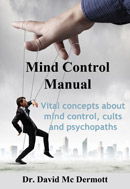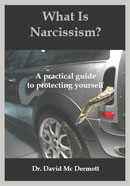More Sociopath Traits
To Be Alert For
Mask of sanity
In Hervey Cleckley's book he outlines 16 sociopath traits after extensive research into the lives of sociopaths. You can read the first group of sociopath traits here
9. Pathologic egocentricity and incapacity for love
The degree of egocentricity can be astonishing. Sometimes they can hide it but careful observation shows it to be unmodifiable and complete. Hervey Cleckley says it can best be expressed by saying that it is an incapacity to love, and in Cleckley's experience with well marked psychopaths, this incapacity is absolute.
He carefully explains that sociopaths are capable of casual fondness and reactions that cause others to matter to them. But these are limited in degree and don't last very long in comparison to normal people.
The word 'absolute' is appropriate, he says, if we're talking about any affective attitude that is strong enough for us to call it love, by which he means anything that is sufficiently strong and lasts long enough to exert a major influence on behavior.
Certainly, sociopaths can be skillful enough to pretend to love a woman or to be devoted to their children. And there are a group of people who seem to be concerned for others only in so far as it enhances themselves (for example, the parent who gives money and attention to a child in order to bask in the child's successes), but psychopaths appear not to even do this.
Even when they say they love someone, their actions in relation to the financial, emotional and physical problems they cause for this person, exposes their true attitude.
Read about the signs your mom is controlling and what happens in a marriage to a sociopath here...
10. General poverty in major affective reactions
Another of the sociopath traits is a general lack of emotions. Any verbal descriptions are more likely to have been learnt then to come from a strength of feeling.
They may exhibit rage, or shallow moods of self-pity and shallow poses of indignation, but wholehearted anger, deep joy and genuine despair are not available. Humor they can feign, but they never have.
11. Specific loss of insight
By this Hervey Cleckley means that the sociopath has no ability to see himself as others see him. Or rather, he has no ability to know how others feel when they see him. Again, this is something that he can pretend, because he has read about it. He can use all the words, and define all the words, but remains blind to what they mean.
It shows up in his belief, for example, that he has committed no crime or that the punishment should not apply to him. Or he asks for a psychologist's report about himself when he should know that such a negative report would be detrimental to his plans.
12. Unresponsiveness in general interpersonal relations
Sociopaths don't respond normally to kindness or trust. No matter how well he is treated there is never any consistent response of appreciation. "One good turn deserves another" is not something the sociopath feels any obligation over.
However, they will often do small courtesies and favors for others, typically to create a sense of obligation in the person receiving the favour, or to create a favorable impression in those who witness it. For example, the 'good neighbor' who cuts the lawn for the widow on the corner, but beats his wife when he arrives home.
13. Fantastic and uninviting behavior with drink and sometimes without
While some sociopaths don't drink, others overindulge frequently. Sometimes there is "shocking, fantastic, uninviting, or relatively inexplicable behavior which emerges when he drinks".
There is vulgarity, a domineering rudeness, petty bickering or buffoonish quasi-maulings of wife, mistress or children and quick shifts between maudlin and vainglorious moods which he says are one of the sociopath traits specific to the psychopath. There is seldom real gaiety or conviviality or any evidence of pleasurable reaction. The alcohol, however, may numb any inhibitions and give rise to outlandish behaviors.
They may need little alcohol for this to start, and before they drink they know what they have done in the past and they drink anyway. They may do things that have no appeal for normal people and they may do things that normal people would never dream of!
Mask Of sanity
14. Suicide rarely carried out
They may threaten it to control and manipulate others. Occasional bogus attempts are made but again they are often premeditated and designed to control.
15. Sex life impersonal, trivial, and poorly integrated
Invariably there are peculiarities in the sociopath's sex life. As in other areas, it only takes the slightest impulse for them to engage in deviant sexual behavior. There is little repugnance or other inhibitions to stop them from trying out different things.
Remember that they cannot love, so sexual aims don't seem to include any important personality relations or any great desire to share an intimate experience. Sex is limited to literal physical contact with none of the emotional aspects that make adult love relations so thrilling and indescribable.
One of the sociopath traits in the group Hervey Cleckley's studied was that they never seemed to find anything emotionally meaningful or personal in the relationships, there were simply localized and temporary sensations.
He believes their sexual promiscuity is probably due to a lack of self restraint rather than to any strong passions or drives.
It's very likely nowadays that many psychopaths have realized intimate sexual contact is a great way to control others. Once a person has given up their intimacy, they have surrendered everything.
16. Failure to follow any life plan
The last of his sociopath traits is about the inability to follow any sort of like plan consistently. They may have lots of big ideas but have severe difficulty in carrying through on any of them. Often trivial impulses are enough to distract his attention.
In the first of the sociopath traits there was the impression of somebody with above-average intelligence and desirable human attributes. When you examine the whole of a psychopath's life, we see that mental competency is sorely lacking. Harvey Cleckley writes that it's like a spectacle that suggests madness in excelsis, despite the absence of all those symptoms that enable us, to some degree, to account for irrational conduct in the psychotic.
More info
Robert Hare, in his book "Without Conscience", also writes about the psychopath traits and the features of the antisocial lifestyle.
Do sociopaths know they are sociopaths?
Read about sociopath tests, the sociopath at work, more about psychopaths, is my boyfriend emotionally abusive? and healing from an abusive relationship.
Like this page?
Consultations
Would you like to talk to someone about your situation?
If you think you are or have been in a cult or a destructive relationship, or a friend or family member might be in a cult and you want to talk to someone, send me a message on the Contact page and we can arrange to talk. All communication will be treated in the strictest confidence.
Available now!

54 Practical Tips For Dealing With Psychopaths and Narcissists
You have the theory but how do you actually apply it? This book spells it out...
Mind Control Manual

Vital concepts about mind control, cults
and psychopaths
Do you think that you might be in an abusive relationship? Are you realizing that the group you are in may be a cult?
What Is Narcissism?

A practical guide to protecting yourself
Do you think you are being taken advantage of emotionally, physically, sexually or financially in your relationship? Do you want to leave but you can't seem to get away?
Tips for dealing with psychopaths and narcissists
Fortnightly newsletter with practical tips and ideasLearn more...
Plus!
'7 Vital Do's and Don'ts of Decision Making' when you subscribe!